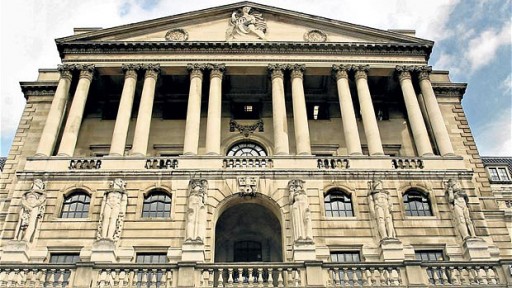- Home
- >
- Daily Accents
- >
- The Bank of England may raise rates sooner than you think—here’s why

The Bank of England may raise rates sooner than you think—here’s why

With the U.K. having held interest rates for the last seven years and stepping back from quantitative easing, the Bank of England's policy meeting this week may not fuel much excitement. But strengthening lending and inflation may mean the bank raises rates sooner than expected — possibly even this year.
On Thursday, the BoE will publish its latest policy decision, minutes from this week's meeting of the Monetary Policy Committee and its quarterly inflation report. The bank's main interest rate is seen remaining at the record low of 0.5 percent, as inflation remains well under the targeted 2 percent year-on-year increase. The consumer price index rose by 0.5 percent in the year to March, according to the latest official U.K. statistics, having gradually risen since October 2015. The U.K.'s Office for Budget Responsibility forecasts inflation will not hit 2 percent until 2018.
Expectations for a rate hike this year have abated following weakening growth forecasts since the end of 2015 and uncertainty ahead of the U.K.'s referendum in June on remaining part of the European Union. Indeed, some economists suggest that if the U.K. were to exit the union, the economic fallout could see the bank cut its main rate even further.
Samuel Tombs, chief U.K. economist at Pantheon Economics, told CNBC the consensus forecast was now for a rate rise in February 2017.
However, he forecast the bank would hike in November this year, assuming the country remained in the union as expected. His prediction was based on signs of increasingly loose credit conditions — particularly in relation to mortgages — and an assumption that inflation would accelerate in the second half of the year.
"Lending standards are slowly loosening … encouraging borrowers to take on even bigger loans," Tombs told CNBC via phone on Friday.
"The stronger growth in credit is one thing that is going to be concerning the MPC … Banks are taking increasing risks now with their lending," he added.
The BoE noted the robust growth in consumer credit in its first-quarter credit conditions review. It highlighted increased provision of car loans and a further acceleration in the mortgage lending market. This latter is something the bank will watch particularly closely, as risky mortgages contributed to the damage suffered by British banks in the global financial crisis of 2007-08.
"We remain vulnerable to the resumption of the rates of credit growth, driven by the housing market, seen in the 10-year upswing of the last cycle," Jon Cunliffe, the BoE's deputy governor for financial stability, warned at a property investment conference in London in February.
Several U.K. banks and building societies have already announced measures to expand the pool of people who can tap mortgages. Barclays has said it will offer 100 percent mortgages, for which no deposits are required, while Halifax, Scottish Widows and Nationwide Building Society have increased the upper-age limit for mortgage approvals.
Tombs said low rates were encouraging borrowers to take on mortgages that might prove unaffordable when they eventually rise.
"I don't think we are in bubble territory yet, but I think if the Bank of England keeps rates on hold … financial stability risks are going to grow," he told CNBC on Friday.
Should the U.K. opt to leave the EU, Tombs forecast the BoE would hold rates for longer, but not make further cuts, given the likely fall in sterling following a "Brexit."
"I think they won't cut rates — they would be more likely to provide the banks with more liquidity if they need it, just to prevent any banks from toppling over. Beyond that I don't think we would see any actual stimulus," he told CNBC.
Like other economists, he warned a Brexit could push the U.K. into a short-term recession.
"We would see a very soft patch for the U.K. economy. [A Brexit] could push it into a recession for a short period. … If we were to go down that [Brexit] path there would be very sharp falls in business investment and outflows that would be quite painful," he said.
On Wednesday, the National Institute of Economic and Social Research's said the U.K. economy grew by 0.3 percent in the three months to April, down from 0.4 percent in the three months to March. The body said the slowdown was in part due to uncertainty ahead of June's referendum — which should dissipate if the U.K. votes to remain in the European Union.
CNBC
 Varchev Traders
Varchev Traders Read more:
If you think, we can improve that section,
please comment. Your oppinion is imortant for us.











